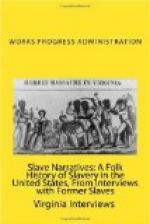“But I’se seen enough. I’s jus’ a-waitin’ for de call to meet all my folks in Heaven. Dey’s a better place dan dis an’ I’s a-tryin’ to treat ever’body right so’s I can git to go to it.
“I’s listenin’ hard for dat call an’ I know it won’t be long a-comin’.”
Susan Snow, Ex-slave, Lauderdale County
FEC
W.B. Allison
Rewrite, Pauline Loveless
Edited, Clara E. Stokes
SUSAN SNOW
Meridian, Mississippi
“Aunt Sue” Snow, a rather small and profusely wrinkled 87-year-old ex-slave, lives in the Negro quarters of the South Side in Meridian.
In spite of her wild escapades, her reputation for honesty and reliability is high and she carries and exhibits with pride numerous letters attesting that fact.
She often finds it necessary to stand and act the story she is telling. Her memory is amazing and she turns with equal readiness to copious quotations from the Scripture and other pious observations to amusing but wholly unprintable anecdotes of her somewhat lurid past.
“I was born in Wilcox County, Alabama, in 1850. W.J. Snow was my old marster. He bought my ma from a man named Jerry Casey. Venus was her name, but dey mos’ly called her ‘Venie.’
“I’s workin’ now for one o’ my old folks. I can’t work much—jus’ carries things to ‘er an’ such. She’s my old mistis’ own daughter an’ she’s got gran’chillun grown an’ married. All de chillun dat’s livin’ is older’n me.
“When her pa bought my mammy, I was a baby. Her pa owned a heap o’ Niggers. I’s de only one still hangin’ aroun’.
“My ma was a black African an’ she sho’ was wild an’ mean. She was so mean to me I couldn’ b’lieve she was my mammy. Dey couldn’ whup her widout tyin’ her up firs’. Sometimes my marster would wait ’til de nex’ day to git somebody to he’p tie her up, den he’d forgit to whup ’er. Dey used to say she was a cunger an’ dey was all scared of ’er. But my ma was scared o’ cungers, too.
“All de Niggers on de place was born in de fam’ly an’ was kin, ’cept my ma. She tol’ me how dey brought her from Africa. You know, like we say ‘President’ in dis country, well dey call him ‘Chief’ in Africa. Seem like de Chief made ‘rangements wid some men an’ dey had a big goober grabbin’ for de young folks. Dey stole my ma an’ some more an’ brung ’em to dis country.
“I don’t ‘member nothin’ ‘bout havin’ no pa. You know, honey, in dem days husbands an’ wives didn’ b’long to de same folks. My ma say her husband was so mean dat after us lef’ Alabama she didn’ want to marry no more.
“A man didn’ git to see his wife ’cept twict a week. Dat was Wednesday an’ Satu’d’y night.
“De women had to walk a chalk line. I never hear’d tell o’ wives runnin’ ‘roun’ wid other men in dem days.
“I was raised in Jasper County. Marster bought lan’ from ever’body ‘roun’ ’til he had a big plantation. He had Niggers, horses, mules, cows, hogs, an’ chickens. He was a rich man, den.




